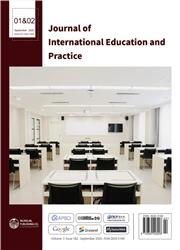Research as A Veritable Tool for Enhancing Students' Job Creation in the 21st Century University Education
引用次数: 0
Abstract
This study explores the role of research as a tool for enhancing students' job creation in the context of 21st-century university education. The survey research design was the approach used for this investigation. The researcher created a questionnaire to collect pertinent data for the study from 200 respondents. The questionnaire was duly validated by 3 experts. The internal reliability of the instrument was examined in this study using Cronbach's alpha (α). Cronbach's alpha method is able to determine the correlation between the outcomes of each test item and the test's total score. Google Forms was used to deliver the survey to the respondents electronically. A statistical package was used to calculate the mean and standard deviation. The study hypotheses were also investigated using inferential statistics (t-test) with 198 degrees of freedom and a 0.05 threshold of significance. To determine whether to accept or reject the null hypothesis, the critical value and estimated t-value are compared. Findings suggest that research-oriented education positively impacts students' ability to create job opportunities in the 21st century. Engaging in research projects fosters critical thinking, creativity, and adaptability among students, enabling them to identify and capitalize on emerging trends and market gaps. Furthermore, the study reveals the significance of university-industry collaborations and mentorship programs in enhancing students' entrepreneurial skills and connecting them with practical resources and networks. The implications of this research are significant for educational policymakers, university administrators, and curriculum developers, as it underscores the importance of incorporating research as an integral component of 21st-century university education.研究是21世纪大学教育促进学生就业的有力工具
本研究探讨了在21世纪的大学教育背景下,研究作为促进学生创造就业机会的工具的作用。调查研究设计是本次调查使用的方法。研究人员制作了一份问卷,从200名受访者中收集相关数据。问卷由3位专家正式验证。本研究使用Cronbach’s alpha (α)检验仪器的内部信度。Cronbach's alpha方法能够确定每个测试项目的结果与测试总分之间的相关性。谷歌Forms用于将调查以电子方式传递给受访者。采用统计软件包计算平均值和标准差。采用推理统计(t检验)对研究假设进行检验,自由度为198,显著性阈值为0.05。为了确定是否接受或拒绝原假设,比较临界值和估计的t值。研究结果表明,研究型教育对21世纪学生创造就业机会的能力有积极影响。参与研究项目可以培养学生的批判性思维、创造力和适应能力,使他们能够识别和利用新兴趋势和市场差距。此外,本研究还揭示了校企合作和师徒计划在提高学生创业技能和连接实际资源和网络方面的重要性。这项研究对教育政策制定者、大学管理者和课程开发者具有重要意义,因为它强调了将研究作为21世纪大学教育不可或缺的组成部分的重要性。
本文章由计算机程序翻译,如有差异,请以英文原文为准。
求助全文
约1分钟内获得全文
求助全文

 求助内容:
求助内容: 应助结果提醒方式:
应助结果提醒方式:


